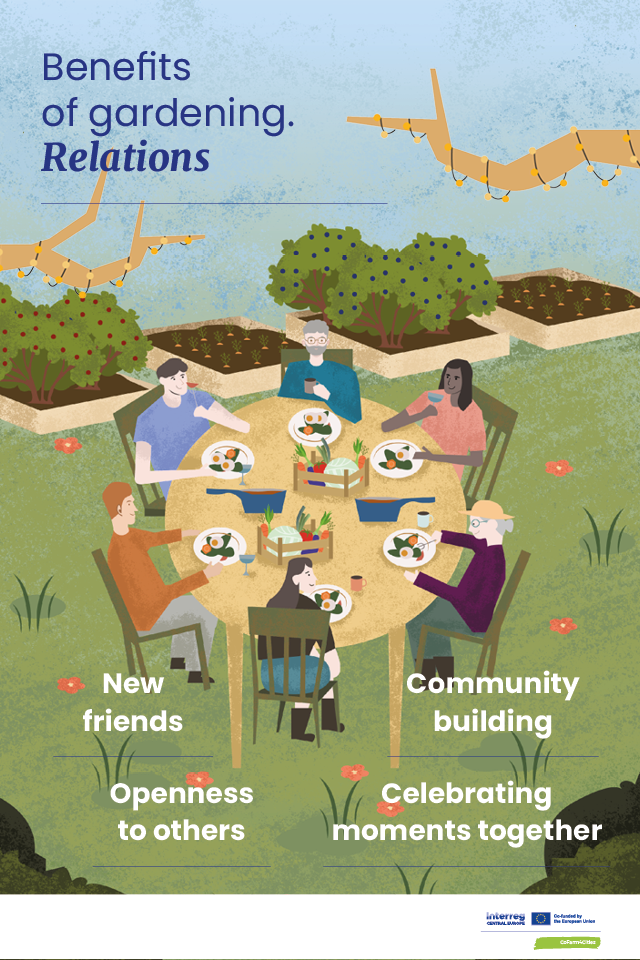Gardening is not only about nurturing plants, but also about building and strengthening relationships with other people. Contact with nature creates a unique environment for cooperation, mutual understanding and shared enjoyment of the results of work. How does gardening affect our interpersonal relationships? 1. New friendships and openness to others Shared gardening activities such as working in community gardens open up a space for making new friends. This makes it easier to break down barriers such as shyness or cultural differences. A study by Thompson et al. (2019) showed that participating in gardening projects can lead to increased levels of empathy and a better understanding of other people’s perspectives. 2. Community building and cooperation Gardening is an excellent example of collaboration. In community gardens, work often requires coordination and sharing of responsibilities. Participants learn to work together, which strengthens the sense of community. As Hanna et al. note in a study published in Landscape and Urban Planning (2017), gardening fosters the creation of local support networks, which can become an important part of community life. 3. Celebrating moments and building traditions Gardening creates opportunities to celebrate small successes, such as the first harvest or successful landscape projects. These moments can develop into traditions, such as annual harvest festivals or community gardening workshops. During such events, people become more connected and relationships gain a deeper dimension. 4. Collaborative problem solving Working in the garden also presents challenges – plant diseases, difficult weather conditions or problems with organisation. Dealing with such difficulties together builds trust and a sense of shared responsibility. A study by Draper and Freedman (2010) noted that participants in community gardens often become more open to dialogue and collaboration even outside the gardening context. 5. Connecting generations Gardening is also a way to build relationships between different generations. Children, adults and seniors can participate in gardening together, exchanging knowledge and experiences. According to research published in the Journal of Intergenerational Relationships, such initiatives help to reduce intergenerational stereotypes and strengthen family and community ties. Gardening is a bridge that connects people regardless of differences. Its potential for building relationships goes far beyond the garden – it is a tool for creating more cohesive and integrated communities. “Community gardening not only promotes individual well-being but also facilitates interpersonal connections and a sense of belonging.” – Draper & Freedman, Journal of Community Health, 2010. “Shared outdoor activities, such as gardening, create opportunities for empathy and mutual understanding, fostering stronger community ties.” – Thompson et al., Journal of Environmental Psychology, 2019. “Gardening spaces serve as platforms for collaboration and collective problem-solving, essential for building trust and cooperative relationships.” – Hanna et al., Landscape and Urban Planning, 2017.
Manage Cookie Consent
To provide the best experiences, we use technologies like cookies to store and/or access device information. Consenting to these technologies will allow us to process data such as browsing behavior or unique IDs on this site. Not consenting or withdrawing consent, may adversely affect certain features and functions.
Functional Always active
The technical storage or access is strictly necessary for the legitimate purpose of enabling the use of a specific service explicitly requested by the subscriber or user, or for the sole purpose of carrying out the transmission of a communication over an electronic communications network.
Preferences
The technical storage or access is necessary for the legitimate purpose of storing preferences that are not requested by the subscriber or user.
Statistics
The technical storage or access that is used exclusively for statistical purposes.
The technical storage or access that is used exclusively for anonymous statistical purposes. Without a subpoena, voluntary compliance on the part of your Internet Service Provider, or additional records from a third party, information stored or retrieved for this purpose alone cannot usually be used to identify you.
Marketing
The technical storage or access is required to create user profiles to send advertising, or to track the user on a website or across several websites for similar marketing purposes.
